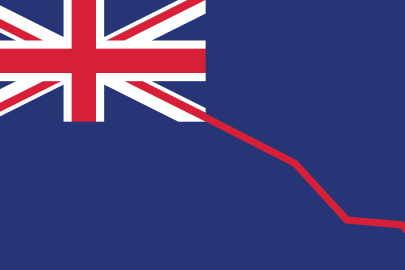Jun 12, 2015 Politics
The UK media describes Ed Miliband’s election result as catastrophic. Miliband, who continued Gordon Brown’s repositioning of Labour far to the left of Tony Blair, won just 30.4 per cent of the vote. He resigned immediately, precipitating a factional war.
Modernisers pointed to the more than 40 per cent that Labour won on Blair’s centre road in 1997 and 2001, and the 35 per cent he managed in 2005, even after careering off on his neo-conservative adventures. Alarmed at such talk, Unite, the UK’s largest union, threatened to cut off funding if a “moderniser” became leader. The party’s manifesto writer said Labour faced its greatest crisis ever and would need to be brutally honest and “go to some dark places” to recover.
In reality, UK Labour’s story since 2005 is nothing compared with New Zealand Labour’s train wreck in the same period. Miliband increased the Labour vote in absolute and percentage terms and was well above the 27.6 per cent nadir under the far-left Michael Foot in 1983. In contrast, New Zealand Labour’s total votes have declined in every election since 2005 and its vote-share in every election since 2002. David Cunliffe’s 25.1 per cent was Labour’s worst result since 1922. Its polling remains under 30 per cent and Andrew Little’s personal numbers are lower than Cunliffe’s ever were. Yet it apparently perceives no crisis.
Instead, New Zealand Labour turned to the intellectual heir of UK Footism, 76-year-old Bryan Gould, to review it. Gould, it should be recalled, was smashed 91 per cent to 9 per cent when standing for the UK Labour leadership against the original moderniser, John Smith. He then opposed Blair’s tack to the centre and still insists he was right. Prudently, Labour has since co-opted Sir Michael Cullen to assist him. But after nearly nine months, the review remains incomplete.
Were Gould’s review to be brutally honest and “go to some dark places”, it would conclude the party has little future under its current name and structure.
“Labour” expressed solidarity with the majority in the first half of the 20th century but has ever-declining resonance in the 21st. Mining, from which it was spawned, now accounts for just 1.7 per cent of GDP. Agriculture, forestry and fishing are down to a combined 5.4 per cent, and manufacturing, even including dairy and meat products, just 11.1 per cent. As in any modern economy, the services sector accounts for two-thirds of GDP. Employment numbers are still skewed to more traditional industries but the proportion of people identifying as “labourers” can only decline. Similarly, union membership. Take out teachers, nurses, Wellington bureaucrats, cleaners, bank tellers and fast-food workers, and almost no one belongs.
The London liberal elite responded to Miliband’s defeat by sneering at the voters for their stupidity. It’s not much different here
Six years ago, Chris Trotter invented the term “Waitakere Man” to describe Labour’s ex-voters: a West Auckland computer programmer, say, and his wife, who own a house in Sunnyvale, enjoy tax deducting business expenses and good annual house-price inflation, and use both to fund annual Pacific Island breaks with their young kids. They plan to employ a minimum-wage school-leaver on a 90-day trial to help out with the business. “Waitakere Man” is a cliché, but clichés only evolve because they’re true.
What does Labour have to say to such a family? More importantly, what do they hear? That Labour, worried about “poverty” and “affordable housing”, wants to cut their home’s value? Or tax it? That they should pay a higher “living” wage to the school-leaver, not just the minimum? That it must be a permanent job or none at all? That it’d be better if they got a proper IT job at a government department and signed up to the Public Service Association?
It must be something like this because, across West Auckland, National now beats Labour hands down. In Te Atatu, National’s margin was 2000; in New Lynn it was 1000; in Mt Roskill 2000; in Mt Albert 3500. Only in Kelston does Labour cling on. Adding to Labour’s peril, National is making steady gains even in Mangere, Manukau East and Manurewa.
The London liberal elite responded to Miliband’s defeat by sneering at the voters for their stupidity. It’s not much different here. Labour denies “Waitakere Man” exists. It’s a party overwhelmed by Wellington and Pt Chev liberals: deep in denial, their contempt for voters growing, their belief undaunted that one more Nicky Hager book or ponytail tug and the “sheeple” will wake up and return home. More likely, the voters Labour derides are perfectly happy with the new place they’ve found. Labour doesn’t know that yet.
This column first appeared in the June 2015 issue of Metro.





